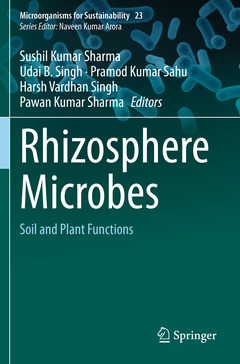Rhizosphere Microbes, 1st ed. 2020 Soil and Plant Functions Microorganisms for Sustainability Series, Vol. 23
Coordonnateurs : Sharma Sushil Kumar, Singh Udai B., Sahu Pramod Kumar, Singh Harsh Vardhan, Sharma Pawan Kumar

Plants create a dynamic micro-biosphere in the soil, around the roots, called as ?rhizosphere?, which harbors diverse number of microorganisms for sustaining their growth and development. A soil with diverse and multi-traits microbial communities is considered healthy to enhance crop productivity. In the last decades, rhizosphere biology has gained attention due to unraveling of new mechanisms, processes and molecules in the rhizosphere that contributes towards the promotion of plant productivity. The rhizospheric microbes and associated processes are being utilized for harnessing potential of soils in effective and sustainable functioning in the agro-ecosystems. Broadly, the book discusses rhizospheric microbes and their role in modulating functions of soil and crop plant. Specifically, it highlights conventional and modern aspects of rhizosphere microbes such as ? microbiome in the rhizosphere, microbes as an indicator and promoter of soil health, rhizosphere microbes as biofertilizer, biostimulator and biofortifyer, microbial signaling in the rhizosphere, recent tools in deciphering rhizobiome, and regulatory mechanisms for commercialization of biofertilizer, biopesticide and biostimulator. The book is useful for agriculture scientist, biotechnologist, plant pathologist, mycologist, and microbiologist, farming community, scientist of R&D organization, as well as teaching community, researcher and student and policy maker.
Sushil Kumar Sharma, National Agriculturally Important Microbial Culture Collection (NAIMCC), ICAR-National Bureau of Agriculturally Important Microorganisms, Maunath Bhanjan, Uttar Pradesh, India. Present Address: ICAR-National Institute of Biotic Stress Management, Raipur, Chhattisgarh, India
Dr Sushil K. Sharma is currently working as a Principal Scientist (Agricultural Microbiology) at ICAR-National Institute of Biotic Stress Management, Raipur, Chhattisgarh, India in the area of microbial resource conservation, secondary metabolites, and antimicrobial peptides for biotic stress management of crops. In the recent past, he worked at ICAR-National Bureau of Agriculturally Important Microorganisms, Maunath Bhanjan, Uttar Pradesh, India in the capacity of Officer In-charge/focal point, National Agriculturally Important Microbial Culture Collection [NAIMCC - International Depository Authority (IDA)-Budapest Treaty Notification No. 338]. He delivered talks in International PGPR conference in Medellin, Columbia in June, 2012 and subsequently in Asian PGPR Conference, Tashkent, Uzbekistan in 2019. So far he had published 110 articles (research, review, book chapter, book etc.) in both national and international journals/book/conferences.
Udai Bhan Singh, Plant Microbe Interaction and Rhizosphere Biology Lab, ICAR-National Bureau of Agriculturally Important Microorganisms, Maunath Bhanjan, Uttar Pradesh, India.
Dr. Udai Bhan Singh, presently working as Scientist (Senior Scale) in the Plant-Microbe Interaction & Rhizosphere Biology Lab, ICAR-National Bureau of Agriculturally Important Microorganisms, Kushmaur, Maunath Bhanjan, Uttar Pradesh, India. His specialized area are: Plant-Microbe Interactions in the rhizosphere with special reference to biotic and abiotic stress management/molecular biology/biotechnology/plant pathology. Dr. Singh has been awarded with ‘DST Young Scientist’ under Fast-Track Scheme, ‘Young Scientis
Date de parution : 01-2022
Ouvrage de 682 p.
15.5x23.5 cm
Date de parution : 01-2021
Ouvrage de 682 p.
15.5x23.5 cm



